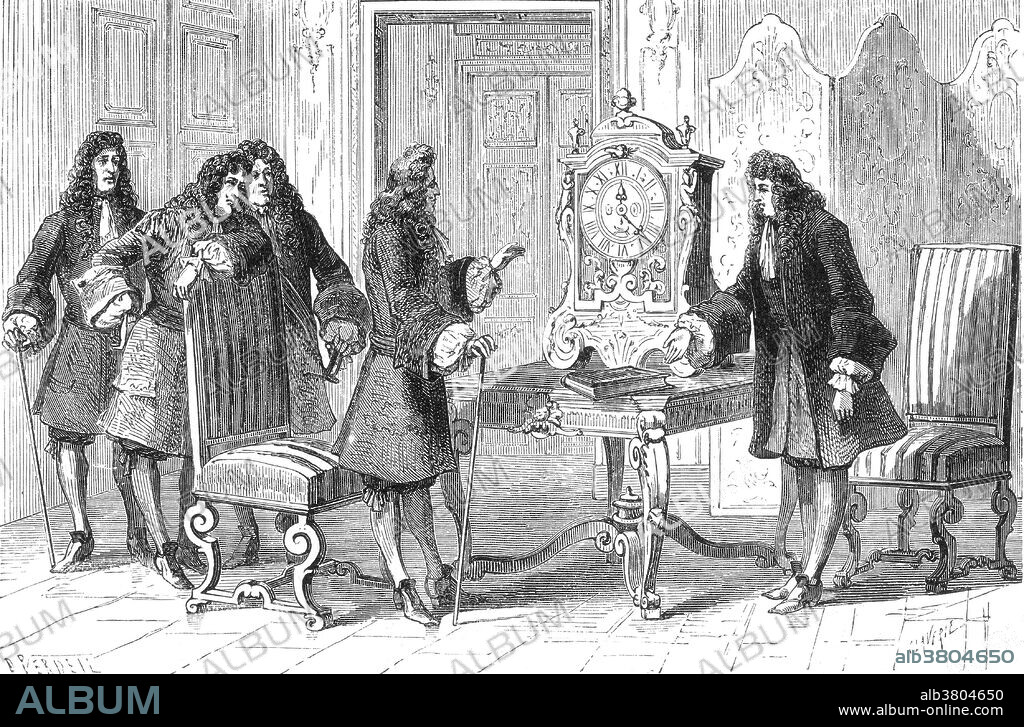alb3804650
Christiaan Huygens Presents to Louis XIV

|
Zu einem anderen Lightbox hinzufügen |
|
Zu einem anderen Lightbox hinzufügen |



Haben Sie bereits ein Konto? Anmelden
Sie haben kein Konto? Registrieren
Dieses Bild kaufen.
Nutzung auswählen:

Titel: Christiaan Huygens Presents to Louis XIV
Untertitel: Siehe automatische Übersetzung
Huygens presents his pendulum clock to Louis XIV. Christiaan Huygens (April 14, 1629 - July 8, 1695) was a prominent Dutch mathematician, astronomer, physicist, probabilist, horologist and scientist. Huygens is remembered especially for his wave theory of light. He investigated the use of lenses in projectors and is credited as the inventor of the magic lantern. His work included early telescopic studies of the rings of Saturn and the discovery of its moon Titan. His invention of the pendulum clock was a breakthrough in timekeeping. He also developed a balance spring watch in the same period as Robert Hooke. Controversy over the priority persisted for centuries. He published major studies of mechanics and optics, and a pioneer work on games of chance. Shortly before his death, Huygens completed Cosmotheoros, published posthumously in 1698. In it he speculated on the existence of extraterrestrial life, on other planets, which he imagined was similar to that on Earth. He argued that extraterrestrial life is neither confirmed nor denied by the Bible, and questioned why God would create the other planets if they were not to serve a greater purpose than that of being admired from Earth. He died in 1695 at the age of 66. Louis XIV (September 5, 1638 - September 1, 1715) was a monarch of the House of Bourbon who ruled as King of France from 1643 until his death. His reign of 72 years and 110 days is the longest of any monarch of a major country in European history.
Huygens presents his pendulum clock to Louis XIV. Christiaan Huygens (April 14, 1629 - July 8, 1695) was a prominent Dutch mathematician, astronomer, physicist, probabilist, horologist and scientist. Huygens is remembered especially for his wave theory of light. He investigated the use of lenses in projectors and is credited as the inventor of the magic lantern. His work included early telescopic studies of the rings of Saturn and the discovery of its moon Titan. His invention of the pendulum clock was a breakthrough in timekeeping. He also developed a balance spring watch in the same period as Robert Hooke. Controversy over the priority persisted for centuries. He published major studies of mechanics and optics, and a pioneer work on games of chance. Shortly before his death, Huygens completed Cosmotheoros, published posthumously in 1698. In it he speculated on the existence of extraterrestrial life, on other planets, which he imagined was similar to that on Earth. He argued that extraterrestrial life is neither confirmed nor denied by the Bible, and questioned why God would create the other planets if they were not to serve a greater purpose than that of being admired from Earth. He died in 1695 at the age of 66. Louis XIV (September 5, 1638 - September 1, 1715) was a monarch of the House of Bourbon who ruled as King of France from 1643 until his death. His reign of 72 years and 110 days is the longest of any monarch of a major country in European history.
Bildnachweis: Album / Science Source
Freigaben (Releases): ? Modellfreigabe: Nein - ? Eigentumsfreigabe: Nein
Rechtefragen?
Rechtefragen?
Bildgröße: 4500 × 2962 px | 38.1 MB
Druckgröße: 38.1 × 25.1 cm | 1771.7 × 1166.1 in (300 dpi)
Schlüsselwörter: ASTRONOMIE • BERÜHMT • BERÜHMTE PERSÖNLICHKEIT • ERFINDER • EUROPAEER (F M) • EUROPAEER • EUROPÄER (F M) • EUROPÄER • EUROPÄISCH • ILLUSTRATION • ILLUSTRATIONS • KOENIG • KÖNIG • MANN • MONARCHIE • NATURWISSENSCHAFTLER • NOTABEL • PERSON • PERSöNLICHKEITEN • PERSÖNLICHKEITEN • PROMINENZ • WISSENSCH.: ASTRONOMIE • WISSENSCHAFTLER • WISSENSCHAFTLICH


 Pinterest
Pinterest Twitter
Twitter Facebook
Facebook Link kopieren
Link kopieren Email
Email
